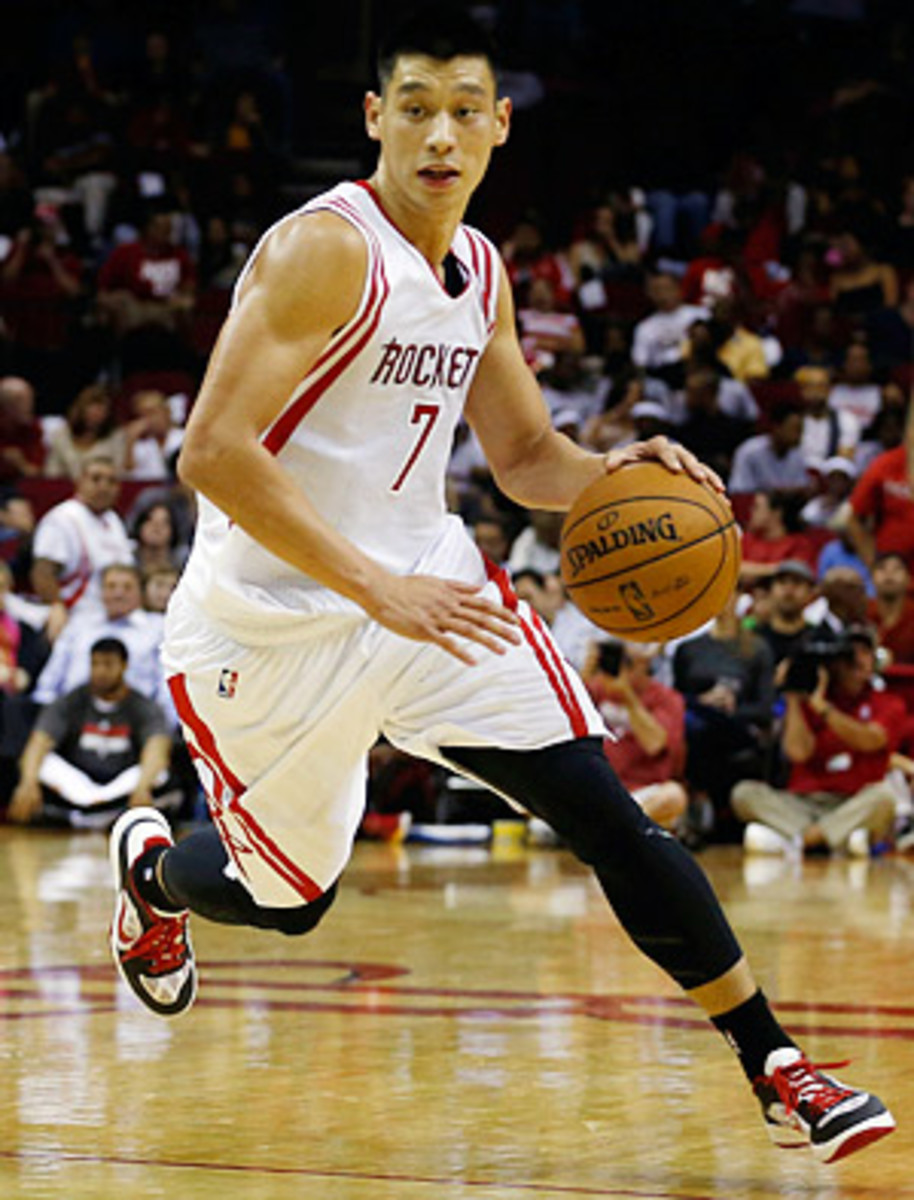Jeremy Lin rethinks free-agency plan that led him from Knicks to Rockets

Jeremy Lin can only look back at his Knicks tenure. (Chris Trotman/Getty Images)

By Ben Golliver
Last year's "Linsanity" was a crystal-clear case of right player, right team, right place, right time. Jeremy Lin needed a job, the New York Knicks needed a point guard, and the rest of the world can always use a good hero.
The fairy tale has collapsed over the last six months. A knee injury, and surgery, ended his 2011-12 season before the playoffs. Then, in a stunning turn of events in July, the Knicks traded for Raymond Felton and signed Jason Kidd to be their top point guards, choosing not to match a three-year, $25.1 million offer sheet to Lin, a restricted free agent, allowing him to leave for the Houston Rockets. Why the Knicks would choose this radical course rather than attempting to rekindle the magic (and reap the benefits) with Lin is a question that's baffled everyone.
Everyone, including Lin. In a GQ Magazine cover story published this week, Lin looks back longingly at his time in New York and even admits that he would have changed his approach during the July free-agency period.
"You can't ask for a city or a fan base to embrace somebody more than they embraced me," he says. "I know it's kind of silly to talk about it with only two years under my belt in the league, but going in before free agency, I was like, 'I want to play in front of these fans for the rest of my career.' I really did. I really wanted to play in front of the Madison Square Garden fans for the rest of my career, because they're just unbelievable."
...
"The Rockets thought I was going to be a Knick," Lin says. "They told me when I signed there, 'We think it's an 80 to 95 percent chance of that happening.' That was consistent with what everyone was saying to me." There was so much certainty that Lin would remain a Knick that his sister-in-law, who had been hired as Lin's business manager, left the country for a wedding. "We all knew he would be a Knick," she says. "I thought, What could happen?"
Now that it's over, would he do anything differently? "I might have been a lot more reserved about everything in free agency," he says -- the implication being that he wouldn't have sought out the offers. "But the thing about it is, there was no other way to handle the situation. I didn't get an offer from the Knicks, so I had to go test my market."
There's a particularly cruel irony at work when a player who made his name by beating impossible odds time and again winds up being denied his dream job, one that he had earned, because he assumed that it was his. The same Lin who came out of nowhere to star at Harvard, who was cut multiple times, and who famously slept on a teammate's couch made the critical mistake of assuming that his long-term future with the Knicks was secure before the ink was dry on the contract.
This assumption wasn't Lin's alone, by any stretch. The Knicks publicly indicated they would do whatever it took to retain him. The fans assumed they would be treated to his late-game heroics for years to come. Most of the Lin discussion in the media during the early summer concerned exactly how much he would be eligible to make under the new collective bargaining agreement. Once an arbitrator settled that issue, there appeared to be no other major hurdles to cross. The rest was generally seen as formality.
Jeremy Lin has struggled early in the preseason with the Rockets. (Scott Halleran/Getty Images)

What, exactly, could Lin have done differently? When he says he would have been "a lot more reserved," he must be referring to execution rather than strategy. As a restricted free agent, he had clear marching orders from the Knicks: Let an outside team set the market and we will match it. It's a routine contract situation with precise protocol. The Knicks' public position was essentially the second-most-aggressive stance they could take. "Get an offer and we'll match it no matter what" trails only, "Here's every dollar we're legally allowed to pay you, don't bother with soliciting outside offers."
Seeking offers was not a mistake. Lin had to and he realizes that. Attempting to negotiate directly with the Knicks, especially as free agency dragged on, would likely have resulted in a serious discount on his deal. The desire to be "more reserved" that Lin expresses, then, must be a result of how he and his representatives handled things behind the scenes, most likely their communication with the Knicks.
Given his immediate global celebrity, his importance to the Knicks and the team's public desire to retain him, Lin can't really be blamed for letting up a bit. But he wouldn't be expressing second thoughts like this if he felt he had done everything properly. The Knicks grumbled that the Rockets and Lin presented them with two offers, one verbal and a second, larger offer that included the "poison pill" third year that made the contract so difficult to match. The situation clearly got personal and comical, as Knicks general manager Glen Grunwald hid from a courier in his Las Vegas hotel room when the Rockets attempted to formally deliver the offer sheet. Perhaps the Knicks felt that Lin could have been more of a team player by sticking to the first deal or somehow influencing the second offer so it wasn't as toxic. Perhaps Lin feels now that he didn't properly express to Knicks management how badly he wanted to remain with the team, or that he could have made some small concession on the offer that would have ensured that he would remain in the Big Apple, or that he had made it more clear to everyone that he was approaching free agency with the goal of producing a win/win agreement for himself and the Knicks.
[polldaddy poll=6615245]
Lin stops short of outright regret here and he shouldn't blame himself. The Knicks held the legal right to retain him and they made the decision to go in a different direction. They did so fully understanding the consequences -- financial, fan relations and otherwise. The buck stops with James Dolan, not Lin, even if he now feels a different, better path could have been found.
The problem for Lin now isn't taking responsibility, it's learning how to move on; it's difficult to perform when your heart is in another place. (Just ask Felton, who slumped through the 2011-12 season with the Portland Trail Blazers yearning to get back to New York, which traded him to the Denver Nuggets the season before.) Indeed, Lin's preseason has been rocky so far: He's shooting 21.1 percent from the field and averaging 5.3 points and 4.7 assists in three games. One assumes that once he settles in, his numbers will improve and New York will be pushed further and further into the back of his mind. There's no escaping the notion that, given the heights he reached last February, his best playing days may be behind him, even though he is still only 24. Whether or not that winds up being the case, Lin is now fabulously wealthy and will spend at least the next three years of his life achieving a dream that, until very recently, seemed impossible.
